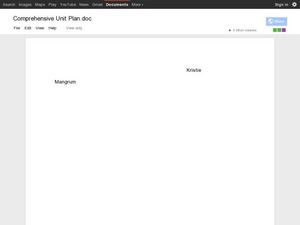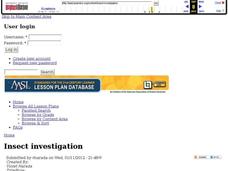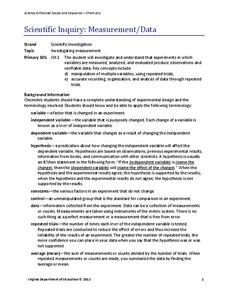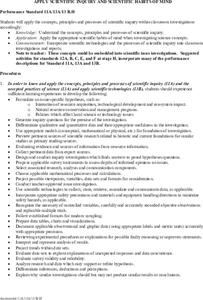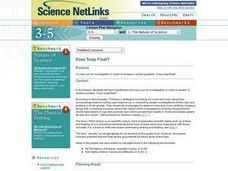Curated OER
Dental Chemistry Analogy
After taking in background information on teeth, marble, eggshell, and fluoride, chemistry aces design an experiment. Their goal is to demonstrate whether or not fluoride has a similar effect on marble or eggshell as it does on tooth...
Curated OER
Riding on a Pendulum
A comprehensive resource gets fourth grade physical scientists making observations about the period of a pendulum and then applying knowledge to a playground swing. Through seven different stations, they will record observations and...
Curated OER
The Life Cycle of the Mealworm
Fourth graders provide a habitat for live mealworms and observe their life cycle. In this animal life cycle and scientific inquiry lesson plan, 4th graders create a habitat for a live mealworm and observe and record related data as it...
Curated OER
Pond Ecology
A lab activity is a great way to incite thoughtful questioning and scientific processes. Pupils will collect organisms with a Petri dish, make observations, sketch the organism, ask questions, then attempt to identify the specimen...
Curated OER
Insect Investigation
Investigation is a brilliant way to spark scientific inquiry. First graders will identify, research, and report what they have learned about a mysterious bug found on the playground. They will use multimedia resources for research and...
Virginia Department of Education
Scientific Inquiry: Measurement/Data
While pupils design their own lab experiments, they will not form a new species. Scholars take their materials and design an experiment regarding reaction rates.
University of Minnesota
Inquiry Cubes
How do you teach kids to "science" effectively? Inquiry cubes are a "sort of" puzzle with no answer—promoting even more questions! Group members work together to use the evidence on the visible sides of each cube to infer what lies on...
Curated OER
Paper Airplanes and Scientific Methods
In this scientific method and paper airplanes worksheet, students go through the steps of the scientific method to determine which paper airplane design is best. They complete 8 steps of the scientific method including stating the...
Curated OER
Apply Scientific Inquiry and Scientific Habits of Mind
Students review the components of the scientific inquiry method. In groups, they develop hypothesis on the issue given to them by their teacher and inquiry questions. They state the data in terms of qualitative and quantitative data. ...
Scholastic
Study Jams! Investigations to Collect Data
Print out the lyrics or show the karaoke video to get your scientists singing about the scientific process! Participants will warble about observations and measurements, data and physical properties. Consider sharing this resource after...
Curated OER
Bird Ecology Unit
Birds, plants, and vegetation, is there anything more lovely? There is! Engage your class in the scientific process, data collection, and data analysis. They stroll their campus observing and identifying various birds and plants,...
Intel
Forensics: Get a Clue
Although the methods are all scientific, forensic science was started by police officers rather than scientists, who relied on observation and common sense. Young detectives use many tools to solve crimes around the school in a...
Baylor College
Heart Rate and Exercise
What is the relationship among the heart, circulation, and exercise? Your class members will explore first-hand how different physical exercises affect an individual's heart rate. They will begin by learning how to measure their own...
The Science Spot
Independent Investigation Guidelines
A neatly formatted outline of the steps of the scientific method can be used as a reference sheet for your future science fair participants. For each step, you will find a few guiding questions or points to remember when working on them.
Curated OER
Generating Hypotheses & Experimental Design 2
An outline walks your scientists through the steps of the scientific process. It begins by taking a general idea and developing a hypothesis based on related factors. Each investigator then plans a method for testing the hypothesis,...
Curated OER
How hard is it?
Inquiry is probably one of the most fun ways kids learn. They will test the hardness of 10 different minerals in order to classify them. They rate each of the minerals from most to least hard. Note: Having real minerals for this...
Curated OER
Absorbancy: What does it mean?
Define the scientific concept of absorbency as it relates to the properties of matter, then conduct an investigation. Learners answer several questions, then investigate the absorbency of several different types of towels. Tip: This...
Curated OER
Does Soap Float?
Students form hypotheses and carry out an investigation in order to answer a central question: Does soap float? The focus of this lesson is on scientific inquiry, but it incorporates scientific topics such as sinking and floating.
Curated OER
Engaging Young Scientists with Inquiry: Part Two
Evaluating data and learning to communicate the results is a big piece of the inquiry puzzle.
Curated OER
What Do Parts Do?
Students review the components of the scientific inquiry method. In groups, they identify and describe the components and functions of all of the parts of a plant. Using a diagram, they label the parts of the plant chosen and share...
Curated OER
Animal Investigation
In this lesson, Animal Investigation, 2nd graders will develop investigative and inquiry skills. Students choose one animal as a class to observe. Students ask questions about the animal and record observations, or answers to the...
Novelinks
Things Fall Apart: Bloom’s Taxonomy
Promote critical thinking and literary analysis with a short activity. Readers of Chinua Achebe's Things Fall Apart respond to a series of questions modeled on Bloom's Taxonomy.
Curated OER
Open Inquiry Using C. elegans
Ever wondered what motivates a roundworm? Introduce your biology class to C. elegans, a non-parasitic model organism that can help them understand behavioral stimuli. Paired pupils design an experiment to test the worm's reaction to...
Curated OER
Chapter 1 Guided Notes: The Science of Biology
Specifically designed as a textbook reading guide, this instructional activity may not apply to your biology course. It asks participants to list characteristics of life and the hierarchical organization levels. It vaguely deals with...




